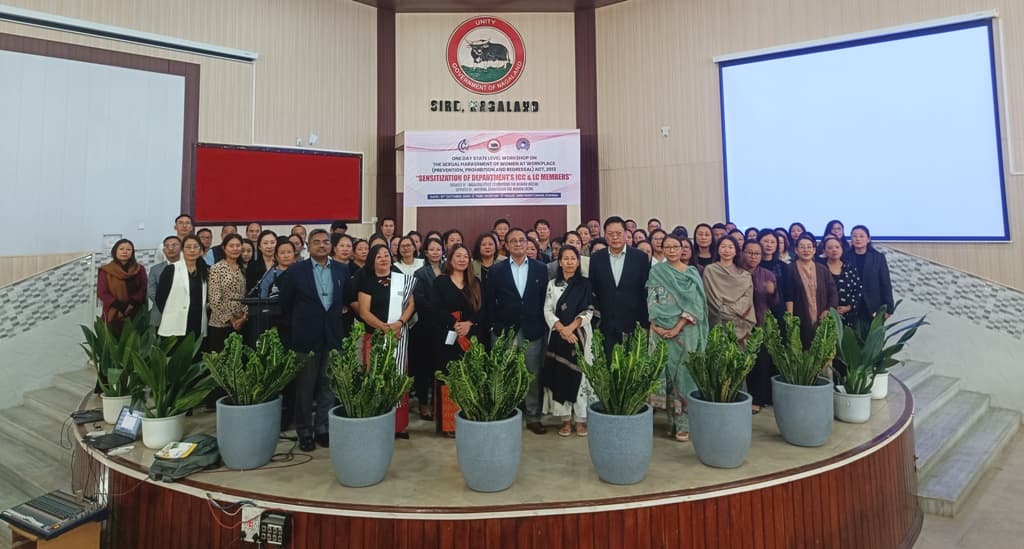NSCW chairperson W Nginyeih Konyak says most workplace harassment cases in Nagaland go unreported due to silence and stigma.
Share

KOHIMA — Many cases of workplace harassment in Nagaland remain unreported due to a “culture of silence” surrounding women’s experiences, according to W Nginyeih Konyak, chairperson of Nagaland State Commission for Women (NSCW).
“Looking at the context of Nagaland, the closely associated and knitted society, and the culture of silence that has been promoted in girls’ education, has conditioned the women to silently be the victim of the patriarchal onslaught, which is why many cases of workplace harassment are not reported,” she said.
Konyak was addressing a one-day state-level workshop on the Sexual Harassment of Women at Workplace (Prevention, Prohibition and Redressal) Act, 2013 (POSH Act), organised by NSCW and supported by the National Commission for Women (NCW), in Kohima on Friday.
Highlighting the provisions of the Act, she said a distinction has been made between sexual harassment and sex-based harassment, pointing out that such behaviour is not always driven by sexual desire but can be “an assertion of power of one sex over the other”. This, she said, affects women’s emotional health and hampers their personal and professional growth.
Also read: Nagaland government defends IAS induction process, calls on JCC to end agitation
She noted that unequal power dynamics within hierarchical workplaces, compounded by patriarchal social structures, make it difficult for women to file complaints. “The most anticipated result of filing a complaint against the perpetrator is either losing the job or similar consequences,” she said, adding that victims are often blamed for the harassment they face when they deviate from societal gender norms.
Konyak said stigma and discrimination also deter women from coming forward, which necessitated legislation like the POSH Act to ensure safe workplaces. She called on all heads of government departments and private sector organisations to strictly adhere to the Supreme Court's directives on constituting Internal Complaints Committees (ICCs) and Local Committees (LCs).
Empower women to speak up
Advisor for Law and Justice, TN Mannen, who also spoke at the programme, said the POSH Act provides a strong framework to ensure workplace safety. He noted that while a “civilised society” expects people to behave decently, cases of misconduct continue to occur, making such legal provisions necessary.
“It is the penalty and punishments inflicted under the Act that hold weight to bring about compliance and create accountability within an organisation,” he said. “Strict enforcement of the POSH Act therefore not only aids in safeguarding victims against harassment but also relieves wrongful conduct by ensuring that employers fulfil their role.”
He added that organisations must take prompt action on complaints to ensure safety, dignity and productivity at the workplace. “To create and maintain congenial atmospheres at workplaces, every worker needs to be aware of such provisions to ensure decency and pleasant atmospheres among co-workers,” he advised.
Mannen added that some organisations fail to comply with the Act’s requirements or have non-functional ICCs, while deep-rooted patriarchal attitudes and power dynamics further hinder implementation.
“There is a need to increase awareness and also, through the Act, empower women to speak up and seek redressal,” he said.
Secretary of Social Welfare, Limawabang, said addressing sexual harassment is not the responsibility of the ICC alone, but also of employers, supervisors and colleagues. “A culture of zero tolerance can only be achieved when silence is replaced with awareness and hesitation with accountability,” he said.
He added that sensitisation should be a continuous, intentional, and institutionally supported process. “When organisations respond with prompt action, confidentiality and compassion, they not only ensure justice but also build trust,” he said.
Resource persons for the technical sessions included advocate and founder of Independent Thought, Vikram Srivastava; legal consultant of NSCW, Apila Sangtam; and director of Prodigals’ Home, Dimapur, K Ela.